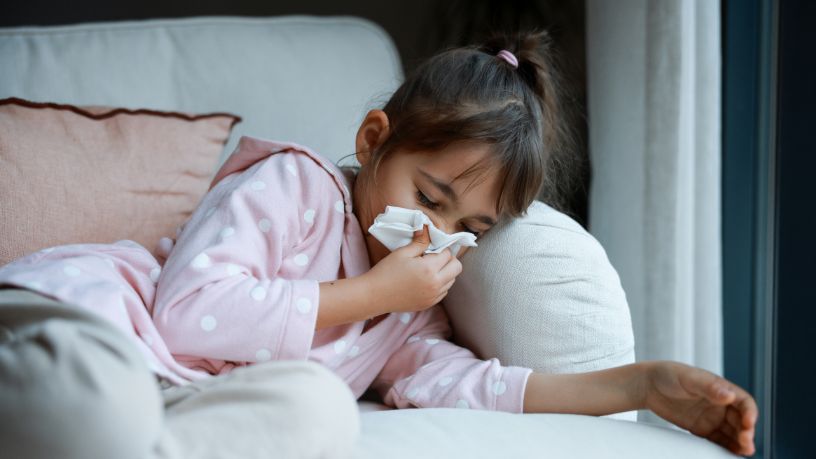Bronchitis is a type of chest infection which is usually caused by a viral infection like cold or flu.
On this page
Key takeaways
The main symptom of bronchitis is a persistent cough.
Smoking and exposure to lung irritants like chemical fumes may increase your risk of catching bronchitis.
If your cold or flu is long gone but you have a nasty cough and wheeze that’s hanging around, it might be bronchitis.
Bronchitis is a type of chest infection where the tubes that carry air to your lungs get inflamed, usually after a cold or flu, causing a persistent cough, mucus, and sometimes trouble breathing.
Bupa GP Dr Janice Tan says bronchitis is quite common, especially during cold and flu season.
“It often starts with a viral infection, like a cold, and can affect people of all ages, though it’s more common in smokers and those with chronic lung conditions,” she says.
There are 2 types of bronchitis:
- acute bronchitis, which usually develops from a cold or other respiratory infection
- chronic bronchitis, which is a constant inflammation of the lining of the bronchial tubes and is usually caused by smoking.
What are the symptoms of bronchitis?
The first symptoms of bronchitis are similar to a cold or the flu. However, the main symptom of acute bronchitis is a cough. This often starts as a dry cough, then eventually produces mucus. This cough can last up to 3 weeks.
"If you're feeling unwell or feeling worse or if the cough persists longer than 3 weeks, then you should see your GP for a review," says Dr Tan.
Other symptoms may include:
- headache
- sore throat
- fever
- fatigue
- chest discomfort
- shortness of breath or wheezing.
Seek medical attention immediately if you have chest pain or trouble breathing.
What causes acute bronchitis?
Bronchitis is usually caused by a virus. It can be spread through the air when someone coughs or sneezes. Sometimes, bronchitis can be caused by a bacterial infection.
To reduce your risk of catching bronchitis or passing it on, you should:
- wash your hands with soap after coughing, sneezing, or blowing your nose, and put tissues in the rubbish bin straight away
- cover your mouth when you cough or sneeze
- stop smoking and avoid being around people who smoke
- stay at home if you feel unwell.
How is bronchitis diagnosed?
"Your doctor may ask you about when or how your illness started, how you've been going and whether you have any contributing risk factors that could lead to severe disease, such as past medical history and smoking history," says Dr Tan.
If you think you may have bronchitis or another type of chest infection, you should see your GP.
They will usually listen to your chest and ask about any other symptoms you may have. Your GP may also:
- take a swab of your nose or throat
- do a blood test
- suggest you have a chest X-ray.
If you have a cough for longer than 3 weeks, always see your doctor.
Is bronchitis dangerous?
"For most healthy people, bronchitis is not dangerous and often clears up on its own within a few weeks," says Dr Tan.
But it can become serious for vulnerable groups like infants, older people and those with a weakened immune system or living with chronic lung conditions like asthma or COPD.
Pneumonia can be a possible complication of bronchitis. So, it's important to monitor symptoms and see a doctor if you're getting worse or not improving.
Repeated bouts of bronchitis could mean you have chronic obstructive pulmonary disease (COPD),1 so always see your doctor if you believe you have a chest infection.
How to prevent bronchitis
Some factors can increase your risk of catching bronchitis. These include:
- cigarette smoke. People who smoke or who live with a smoker are at higher risk of both acute bronchitis and chronic bronchitis2
- low resistance. If you have another illness or a compromised immune system, you may be more at risk of catching bronchitis
- exposure to irritants. Chemical fumes and lung irritants such as smoke can increase the risk of bronchitis
- gastric reflux. Repeated bouts of severe heartburn can irritate your throat. This can make you more prone to developing bronchitis.3
There isn't a vaccine against bronchitis. However, getting vaccinated against other illness can reduce your risk of chest infections.
It's recommended that everyone over 6 months old gets the annual flu shot. Your GP may also suggest the pneumococcal and/or whooping cough vaccine, especially if you're in a higher-risk group.
Depending on your age and risk factors, a COVID-19 booster vaccine may also be recommended.
How is bronchitis treated?
Most acute bronchitis is caused by a virus. Antibiotics won't help as they don't work against viruses.
There are some simple ways you can help treat bronchitis at home:
- Drink plenty of fluids. This can thin mucus, making it easier to cough up and get rid of. It also helps to keep the body hydrated and aid your recovery from bronchitis
- Use a humidifier or hold your head over a bowl of steaming water. Warm steam can help open up your nasal passages and chest, making it easier to breathe.
- Take pain relief. Over-the-counter (OTC) pain relief like ibuprofen or paracetamol may help reduce chest discomfort or any fever from bronchitis.
- Use expectorants. These can help clear any mucus from your air passages. Ask your doctor or pharmacist for a good over-the-counter option.
- A teaspoon of honey. Honey is a time-honoured home remedy to help suppress a cough. Honey is considered a better option than over-the-counter cough and cold medications for children older than 12 months old.4 Do not give honey to babies under 12 months old, because of a risk of botulism.
Avoid smoking or being around those who smoke as it can further inflame the bronchial tubes.
"Bronchitis can be pretty unpleasant, but it's often manageable with rest and home remedies under the guidance of your GP if needed," says Dr Tan. "If you're not getting better, it's important to check back in with your GP as soon as possible."
Resources
Healthdirect provides free health advice and information. Visit their website or call them on 1800 022 222.
The Department of Health and Aged Care offers advice on available vaccines and eligibility for free vaccination programs.

At Bupa, trust is everything
Our health and wellbeing information is regularly reviewed and maintained by a team of healthcare experts, to ensure its relevancy and accuracy. Everyone's health journey is unique and health outcomes vary from person to person.
This content is not a replacement for personalised and specific medical, healthcare, or other professional advice. If you have concerns about your health, see your doctor or other health professional.
1Ralalage, D., & Hurst, J. (2023). Chronic obstructive pulmonary disease: aetiology, pathology, physiology and outcome. Medicine, 51(10), 679-762.
2Zock, J. P., Sunyer, J., Kogevinas, M., et al. (2000). Occupation, Chronic Bronchitis, and Lung Function in Young Adults: An International Study. American Journal of Respiratory and Critical Care Medicine, 163(7), 1,572-1,577.
3Gaude, G. S. (2009). Pulmonary manifestations of gastroesophageal reflux disease. Annals of Thoracic Medicine, 4(3), 115-123.
4The Royal Australian College of General Practitioners. (2014). Honey: cough in children with URTI. The Royal Australian College of General Practitioners.
You might also like...
Chest infection and cough: Home remedies to ease the pain
Chest infections (like bronchitis and pneumonia) can affect anyone at any age. We asked a GP what you can do to ease your symptoms at home.
5 remedies to help soothe a sore throat
Sore throats are a common problem, especially as the weather gets colder. But there are a few things you can do at home to help ease your symptoms.
The best flu treatments and remedies for winter
Flu symptoms can be debilitating, but an annual vaccination, certain medications and some tried and tested home remedies can help you get better faster.
Why get the flu shot?
Your annual flu jab can help reduce your risk of catching the virus and lower the severity of your symptoms if you do get it. Find out how it works.





